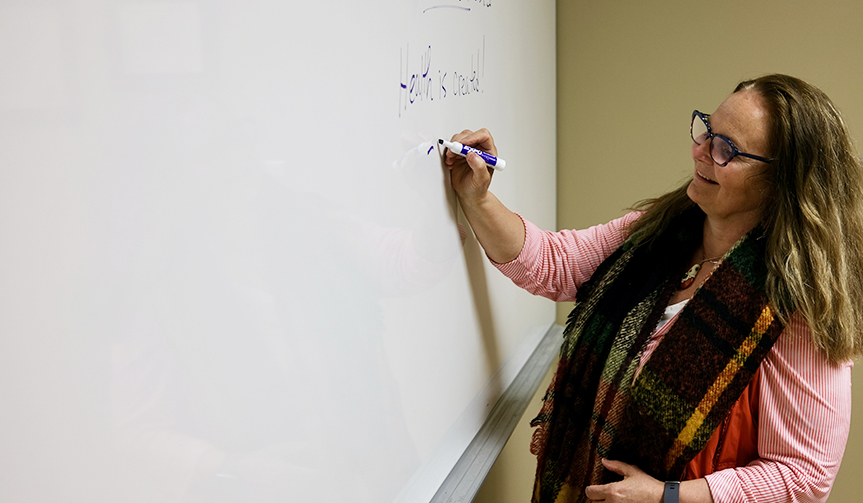
Laura MacDonald [Dip.D.Hyg./81, M.Ed./87, PhD/21] was recently in a videoconference with students from the bachelor of science in dental hygiene program. When the learners finished their presentation, MacDonald, who was working from home, gave them a standing ovation at her dining room table.
“I said to the students, ‘You know, you are inspiring, and this just brings joy to me,’” says MacDonald, an associate professor in the School of Dental Hygiene at the Dr. Gerald Niznick College of Dentistry. “What the students pulled together was novel, innovative and creative.”
Those three adjectives also describe MacDonald’s approach as an award-winning educator. Throughout her 36 years of teaching at the School of Dental Hygiene, she has followed her curiosity and passion.
“I have always asked the ‘Why, why, why?’” she says. “It’s my character. That’s the forever academic in me.”
MacDonald is a lifelong learner. Whenever she comes across an innovative concept or learning tool, she’s eager to introduce it in the classroom.
Several years ago, she brought the concept of “fit to sit” into her teaching. Dental hygienists are known to experience aches and pains, she says, and should combat this to be able to provide quality care. MacDonald devised a workout specifically for their job-related fitness needs.
Health promotion is the thread that weaves throughout MacDonald’s career. Growing up in Winnipeg she saw the work her father, Dr. Cliff McCormick, a public health dentist, did to help people with limited access to care. She felt the same drive to reach out.
After completing her diploma in dental hygiene at UM in 1981, she went back to school to earn a bachelor’s degree in the same field at the University of Toronto. She worked as a dental hygienist in periodontal dental practices, personal care homes and remote northern communities before enrolling in the education master’s program at UM.
In her quest to ask “why,” MacDonald completed her PhD in applied health sciences at UM in last year. Her research centred on salutogenesis and how it applies to the educational environment at the dental college from the perspective of healthy learning.
Salutogenesis is the approach to health that focuses on the creation of health and well-being, as opposed to the prevention of disease.
In her research, MacDonald found that the curriculum gives dental hygiene and dental students insight into their professional responsibility to become disease-preventing resources for patients. But there is still work to be done for students to see themselves as “salutogenic agents” who will enter practice as health-creating resources.
“Healthy learning is both a process and an outcome,” MacDonald says. “In health professional education, the learning journey is healthy when we have empowering conditions, active and reciprocal interactions, and clear structures so that learners know deeply that health is everyone’s responsibility – that we collectively create health.”
The professor says she is delighted to see dental hygienists across Canada pursuing graduate studies.
“Every profession needs philosophers, scholars and researchers to contribute to the professional body of knowledge, to be positioned to provide best practice, and to be agents of health-creating care.”
BY MATTHEW KRUCHAK
